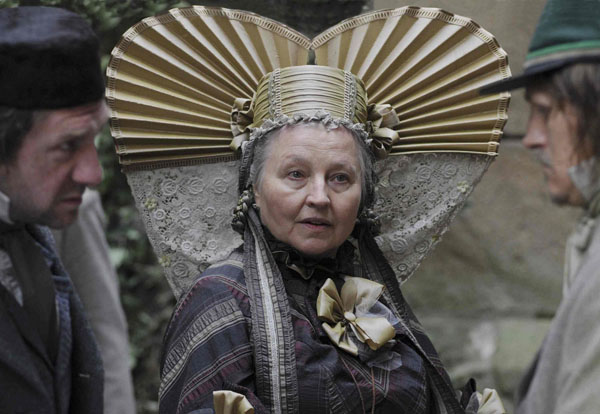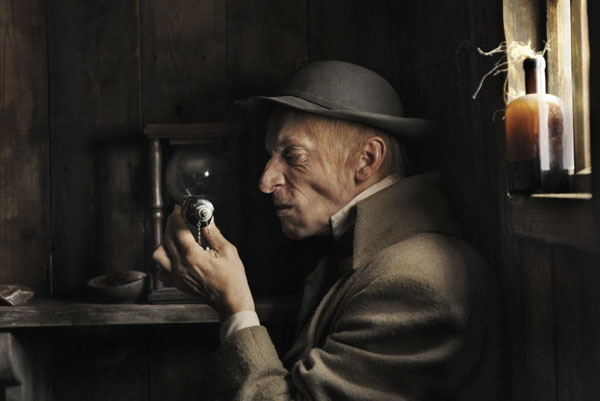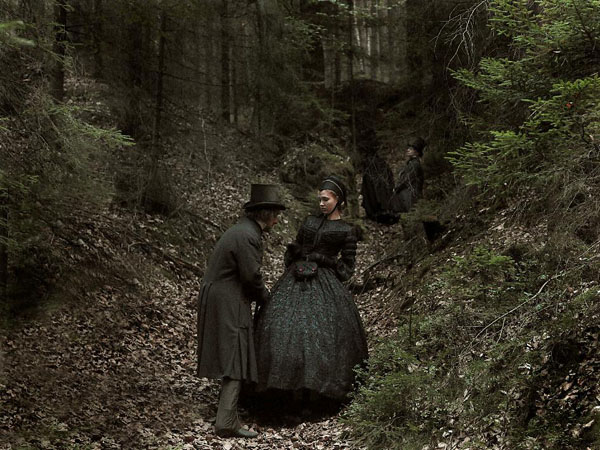Let’s begin with Max Nelson‘s introduction to a list drawn up for Film Comment: “The Faust legend—freshly reinterpreted in Aleksandr Sokurov’s film, which opens [today] at Film Forum and the Film Society of Lincoln Center—first appeared in print in late 16th-century Germany by way of a handful of anonymously authored booklets. Over the centuries, its core premise—an ailing scholar sells his soul to the Devil in exchange for (depending on the teller) youth, wisdom, power, or genius—has been refracted and tinted through a series of great literary interpreters, from Marlowe to Mann. The most influential re-telling is arguably Goethe’s, which transformed the tale into an allegory for the limits of reason, the risks of passion, and the struggle to believe. In the 20th century, the story would go on to inspire a rich tradition of filmmakers, from silent masters to European expats and Russian mystics.” What follows are five paragraphs (with trailers or clips) on five films, beginning, of course, with F.W. Murnau‘s Faust (1926).
The Dissolve‘s Scott Tobias: “Since 1999’s Moloch, about Adolf Hitler’s retreat to Bavaria with Eva Braun, Joseph Goebbels, and Martin Bormann, Russian director Alexander Sokurov has been working intermittently on a series of films about the corruptions of power, each with a distinct tone and visual texture. He followed up Moloch with 2001’s Taurus, a mournful chamber piece about the last days of Vladimir Lenin, and 2005’s The Sun, an uncharacteristically funny portrait of Emperor Hirohito in the waning days of World War II, including his encounter with General Douglas MacArthur. Now Sokurov has completed the tetralogy with Faust…, a fitting postscript to three stories about 20th-century historical figures who struck catastrophic bargains of their own.”
“Viewed alongside its predecessors,” writes A.O. Scott in the New York Times, “Faust, which forsakes history for fable, can be understood as an attempt to trace the pathology of modern totalitarianism to its historical and psychological source in the quest for scientific knowledge and everlasting life.”
This “may be the freakiest gloss this deal-with-the-devil story’s ever gotten, down to the ghost-zombies and Icelandic geysers,” writes Michael Atkinson in the Voice. “Sokurov re-creates a breathtaking Bruegel landscape and troubles it with a penniless, discontented Faust (Johannes Zeiler, something like a hangdog Ralph Fiennes), who half-desires knowledge, wealth, and the young Margarete (Isolda Dychauk), not necessarily in that order, and sometimes not at all. Enter the Moneylender (Anton Adasinsky), a demon in earthly garb, engaging Faust in protracted negotiations and embroiling him in a variety of accidents and brawls.”
“There’s an overwhelming impression… that life is clownish, fragile, and cramped,” writes Ignatiy Vishnevetsky at the AV Club. “In lieu of a handsome and terrifying Mephistopheles, the viewer gets Mauricius, who has a grotesque body, no genitalia, and a rank odor. He isn’t even smart; the contract he draws up for Faust’s soul is riddled with spelling and grammatical errors. Point being, because life is miserable, earthly pleasure is meaningless—it’s just a different expression of decay. The only desirable thing is power.” This Faust “manages to convey a desire for power in abstract terms, divorced from material gain or a need to be admired. What’s more, it manages to do it with energy and a good deal of weird humor.”
For Time Out New York‘s Joshua Rothkopf, “the flow feels especially Russian—long conversational walks, distant forest noises, weird explosions of pissiness. Often, Faust plays like a lost cousin to Andrei Tarkovsky’s haunted Stalker (1979), catnip for the slow-and-low crowd.”
Mark Jenkins, writing for NPR, finds that Faust “encompasses themes familiar from the director’s other work: masculinity, alienation, the uneasy balance of earthiness and ethereality. At times, it’s hard to imagine that anyone—even the filmmaker’s recent patron, Vladimir Putin—is as interested in this stuff as Sokurov is.”
At RogerEbert.com, Godfrey Cheshire makes special note of “Hanna Schygulla as Mauricius’s wife, an ancient and strangely attired matron, and the actress’ presence inevitably suggests links between Sokurov and certain New German Cinema predecessors. The Russian director’s dazzling camera choreography does, in fact, recall not only F.W. Murnau’s 1926 Faust but also later masterworks such as Rainer Werner Fassbinder’s Berlin Alexanderplatz, while its meticulously realized settings bring to mind Werner Herzog’s Kaspar Hauser. Do all these cultural reference points—cinematic, literary, painterly, musical, what have you—add up to a masterpiece? Obviously not, per se. But they do help explain why Sokurov’s work can excite a cinephile’s continuing interest while simultaneously sparking his skepticism.”
“Around when Faust took the top prize at the Venice Film Festival in 2011, Sokurov was quoted as saying his primary interests are literary rather than cinematic,” notes Bill Weber in Slant, “and while much of his previous work undercuts that claim, here he seems to have a point. Bruno Delbonnel’s cinematography, in muted tones of gray and sickly green, enforce the aggressively chilly ambience of this remixed classic, right through Faust’s violent rebellion against his dark master. But more often the total effect is of a critical treatment of all the Fausts that have come before, from Goethe and Marlowe to the movie age, and Sokurov’s more bewildering flourishes may rest on being steeped in that centuries-long sequence of adaptation and evolution. It’d be cheap, and inaccurate given the filmmaker’s palpable commitment, to say his Faust has no soul, but though its ballast of jokes and spectacle are formidable, it often lurches about at a remote, enigmatic distance.”
Updates, 11/16: “Sokurov, who has created such striking, painterly portraits of intimacy as Mother and Son, here counters visions of beauty with degradation,” writes Ela Bittencourt in Reverse Shot. “Nowhere is this more evident than in the bathhouse scene that Sokurov stages as an orgy of the senses. As half-naked laundresses toil at their washboards, Mauritius sheds his clothes and steps into a bathing pool—an image straight out of Hieronymus Bosch, of a body so mangled it elicits the women’s disgust. Sokurov mitigates this sight with pleasure: the women’s white undergarments glow ethereally, bringing out their bodies’ softness and voluptuousness, as if in a Peter Paul Rubens painting.”
Daniel Kasman has tweaked and reposted his 2011 review at the Notebook. Once Faust and Mauritius are a team, the film “truly stretches its legs, with its whole course feeling like a frenzied walk in a crooked loop around the world, peering into crannies, stepping into taverns, washrooms and apartments, circling the town forest. Bodies are all in motion, above all the manic, lurching and malformed money-lender and the relentlessly pacing Faust. All is frustrated, eager circulation, all tied to the constant questions the man asks himself, asks no one, and asks in the fluid dialogues with those around him which weave between the quotidian and the philosophical.”
Update, 12/1: “Sokurov’s Faust is quite unlike any other cinematic event I’ve encountered this year,” writes Peter Labuza, who encounters quite a few movies during the course of a year. “What makes Sokurov’s cinema so exciting is that he’s an original, not obsessed with the type of references to his elders that defines too much of contemporaries. While certainly owing debt to Tarkovsky, his most apparent references are outside (that cinema became his art form of choice, despite his mastery of it, seems coincidental). He seems more indebted to someone like De Tocqueville’s inquiring sociological eye, Dickens’s melodramatic realism, Doestovsky’s conversion narratives, and certainly Chekov’s absurdism…. Faust’s most obvious painterly references are certainly Rembrandt (the film’s opening scene perhaps a reference to The Anatomy Lesson of Dr. Nicolaes Tulp) through his obsession with displaying faces and bodies in their full grotesque palette, but finding visual spectacle in the negative space. There are elements of Bruegel in his parade through the village, a Botticelli in the Venus like portraiture of Margarete, and an ending out of Freidrich’s Wanderer Above the Sea of Fog, except Sukurov’s Faust refuses the awe of the event he sees, actively denying God before him.”
For news and tips throughout the day every day, follow @KeyframeDaily on Twitter and/or the RSS feed. Get Keyframe Daily in your inbox by signing in at fandor.com/daily.






